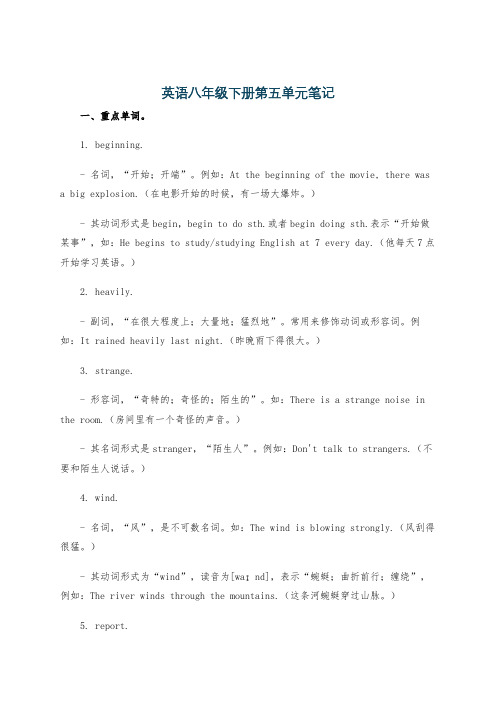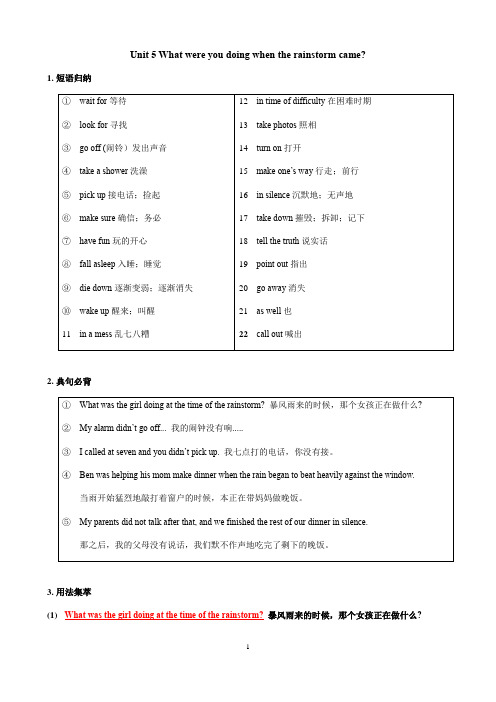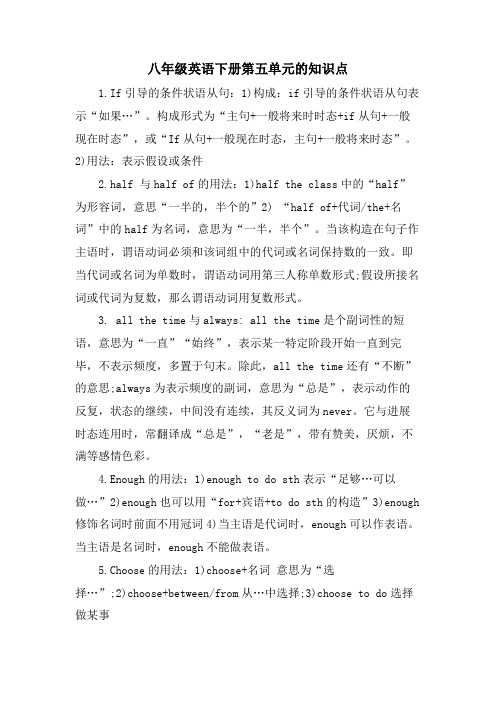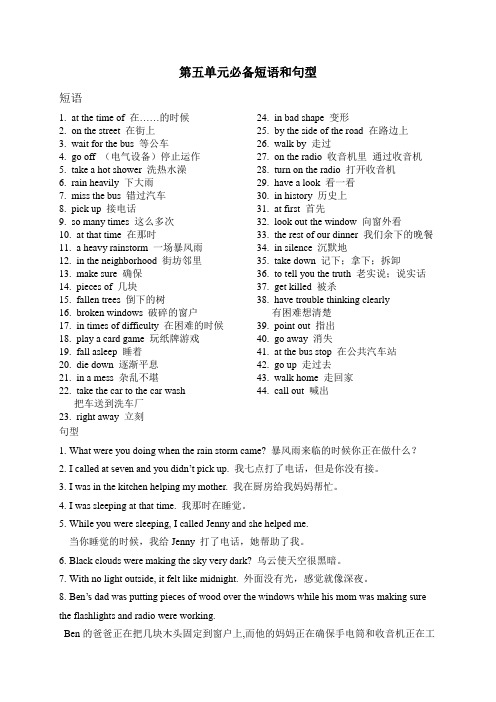英语八年级下册第五单元
英语八年级下册第五单元笔记

英语八年级下册第五单元笔记一、重点单词。
1. beginning.- 名词,“开始;开端”。
例如:At the beginning of the movie, there was a big explosion.(在电影开始的时候,有一场大爆炸。
)- 其动词形式是begin,begin to do sth.或者begin doing sth.表示“开始做某事”,如:He begins to study/studying English at 7 every day.(他每天7点开始学习英语。
)2. heavily.- 副词,“在很大程度上;大量地;猛烈地”。
常用来修饰动词或形容词。
例如:It rained heavily last night.(昨晚雨下得很大。
)3. strange.- 形容词,“奇特的;奇怪的;陌生的”。
如:There is a strange noise in the room.(房间里有一个奇怪的声音。
)- 其名词形式是stranger,“陌生人”。
例如:Don't talk to strangers.(不要和陌生人说话。
)4. wind.- 名词,“风”,是不可数名词。
如:The wind is blowing strongly.(风刮得很猛。
)- 其动词形式为“wind”,读音为[waɪnd],表示“蜿蜒;曲折前行;缠绕”,例如:The river winds through the mountains.(这条河蜿蜒穿过山脉。
)5. report.- 名词,“报告;报道”。
例如:I read a report about the accident in the newspaper.(我在报纸上读到了一篇关于这个事故的报道。
)- 动词,“报道;公布”。
如:The journalist reported the news on TV.(这位记者在电视上报道了这条新闻。
八年级下册英语第五单元单词及知识点

八年级下册英语第五单元单词及知识点本文介绍了八年级下册英语第五单元的部分单词及相关知识点。
一、单词列表:1. vegetable (n.) 蔬菜2. beef (n.) 牛肉3. pork (n.) 猪肉4. mutton (n.) 羊肉5. shrimp (n.) 虾6. shellfish (n.) 贝类7. crab (n.) 螃蟹8. lobster (n.) 龙虾9. squid (n.) 鱿鱼10. salad (n.) 沙拉11. fried (adj.) 煎的,油炸的12. spicy (adj.) 辣的13. sour (adj.) 酸的14. menu (n.) 菜单15. order (v.) 点菜16. bill (n.) 账单17. tip (n.) 小费18. customer (n.) 顾客19. service (n.) 服务20. receipt (n.) 收据二、知识点解析:1. 食物类词汇:vegetable (n.) 指各种蔬菜,如tomato (西红柿), potato (土豆)等。
beef (n.) 指牛肉。
pork (n.) 指猪肉。
mutton (n.) 指羊肉。
shrimp (n.) 指虾,是常见的海鲜食材。
shellfish (n.) 是一个总称,泛指贝类,如crab (螃蟹), lobster (龙虾)等都属于shellfish。
squid (n.) 指鱿鱼。
salad (n.) 是一道凉拌的菜肴,通常由蔬菜和其他配料组合而成。
2. 形容词:fried (adj.) 指油炸的食物,如fried shrimp (炸虾)。
spicy (adj.) 指辣的食物,如spicy beef (辣牛肉)。
sour (adj.) 指酸味的食物,如sour salad (酸沙拉)。
3. 餐厅用语:menu (n.) 指菜单,是列有各种食物或饮品供顾客选择的列表。
人教版八年级下册英语Unit 5 知识点语法归纳总结

Unit 5 What were you doing when the rainstorm came?1.短语归纳2.典句必背3.用法集萃(1)What was the girl doing at the time of the rainstorm?暴风雨来的时候,那个女孩正在做什么?❖本句是特殊疑问句,时态是过去进行时,结构是“What+was/were+主语+doing+其他?”,用于询问某人在过去的某个时间正在做的事情。
例:—What were you doing at nine o’clock yesterday evening? 昨天晚上九点你正在做什么?—I was watching TV at home. 我正在家里看电视。
❖拓展:过去进行时描述过去某个时刻正在发生的动作或存在的状态,结构是“was/ were+动词的现在分词”。
例:When I got home my mother was cooking. 我到家的时候我妈妈正在做饭(2)My alarm didn’t go off... 我的闹钟没有响.....❖go off意为“(闹钟)发出响声”例:My alarm goes off at six every morning. 我的闹钟每天早晨6点响。
❖归纳:go off还有“离开”和“变质”之意。
例:Bob went off to get a drink. 鲍勃拿饮料去了。
Meat goes off quickly in hot weather. 热天肉变质得快。
❖拓展:go的短语(3)I called at seven and you didn’t pick up. 我七点打的电话,你没有接。
❖pick up意为“接电话”。
pick up有如下含义:(4)I called again at eight and you didn’t answer then either. 我八点再打来,你也没接。
八年级下册第五单元英语单词

八年级下册第五单元英语单词Unit 5rainstorm[ˈreɪnstɔ:m]n.暴风雨alarm[əˈlɑ:m]n.闹钟go off(闹钟)发出响声begin[bɪˈgɪn]v.开始heavily[ˈhevɪli]adv.在很大程度上,大量地suddenly[ˈsʌdənli]adv.突然地pick up(=pick up the phone)接电话strange[streɪndʒ]adj.奇怪的,陌生的,奇特的storm[stɔ:m]n.暴风雨wind[waɪnd]n.风light[laɪt]n.&v.电灯;点燃report[riˈpɔ:t]v.报导,报告area['eərɪə]n.范围,地域,地区wood[wʊd]n.树木,木材,树木window[ˈwindəu]n.窗户flashlight['flæʃlaɪt]n.手电筒,火炬match[mætʃ]n.火柴,比赛beat[bi:t]v.敲打,打败against[əˈgenst]prep.反对,对……不利asleep[əˈsli:p]adj.睡着的,熟睡的fall asleep进入梦乡,睡着die down逐渐变弱,逐渐消失rise[raɪz]v.上升,升起fallen[ˈfɔ:lən]adj.倒下的,落下的apart[əˈpɑ:t]adv.分离,分开have a look看一看icy[ˈaɪsɪ]adj.覆盖着冰的,冰冷的kid[kɪd]n.&v.(口语)小孩;开玩笑,欺骗realize[ˈri:əlaɪz]v.认识到,了解make one's way前往,费力地前进passage[ˈpæsɪdʒ]n.章节,段落pupil[ˈpju:pl]n.学生completely[kəmˈpli:tli]adv.彻底地,完全地shocked[ʃɔkt]adj.震惊的,震撼的silence[ˈsaɪləns]n.寂静,沉默in silence沉默,无声recently[ˈri:sntli]adv.不久前,近来,最近take down拆除,往下拽,记录terrorist[ˈterərɪst]n.恐怖分子date[deɪt]n.日期,日子tower[ˈtaʊə(r)]n.塔at first首先,最初truth[tru:θ]n.真相,真理,事实。
八年级英语下册第五单元的知识点

八年级英语下册第五单元的知识点1.If引导的条件状语从句:1)构成:if引导的条件状语从句表示“如果…”。
构成形式为“主句+一般将来时时态+if从句+一般现在时态”,或“If从句+一般现在时态,主句+一般将来时态”。
2)用法:表示假设或条件2.half 与half of的用法:1)half the class中的“half”为形容词,意思“一半的,半个的”2) “half of+代词/the+名词”中的half为名词,意思为“一半,半个”。
当该构造在句子作主语时,谓语动词必须和该词组中的代词或名词保持数的一致。
即当代词或名词为单数时,谓语动词用第三人称单数形式;假设所接名词或代词为复数,那么谓语动词用复数形式。
3. all the time与always: all the time是个副词性的短语,意思为“一直”“始终”,表示某一特定阶段开始一直到完毕,不表示频度,多置于句末。
除此,all the time还有“不断”的意思;always为表示频度的副词,意思为“总是”,表示动作的反复,状态的继续,中间没有连续,其反义词为never。
它与进展时态连用时,常翻译成“总是”,“老是”,带有赞美,厌烦,不满等感情色彩。
4.Enough的用法:1)enough to do sth表示“足够…可以做…”2)enough也可以用“for+宾语+to do sth的构造”3)enough 修饰名词时前面不用冠词4)当主语是代词时,enough可以作表语。
当主语是名词时,enough不能做表语。
5.Choose的用法:1)choose+名词意思为“选择…”;2)choose+between/from从…中选择;3)choose to do选择做某事6.Exercise的用法:1)运动,锻炼,是不可数名词2)体操,练习,是可数名词。
3)动词,使….运动7.wear, put on, have on, dress: wear“穿着”“戴着”,表示状态,是延续性动词,一般现在时表示经常状态,现在进展时表示暂时状态;put on“穿上”“戴上”,表示动作,是非延续性动词;have on“穿着”“戴着”,表示状态可以与wear互换;dress“穿上”“穿着”,既表示状态,也表示动作,既可以作及物动词,也可以作不及物动词。
八年级下册英语第5单元单词

八年级下册英语第5单元单词人教版rainstorm /ˈreɪnstɔ:m/ n. 暴风雨alarm /əˈlɑ:m/ n. 闹钟go off (闹钟)发出响声begin /bɪˈgɪn/ v. 开始heavily /ˈhevɪli/ adv. 在很大程度上,大量地suddenly /ˈsʌdənli/ adv. 突然地pick up(=pick up the phone) 接电话strange /streɪndʒ/ adj. 奇怪的,陌生的,奇特的storm /stɔ:m/ n. 暴风雨wind /waɪnd/ n. 风light /laɪt/ n. & v. 电灯;点燃report /riˈpɔ:t/ v. 报导,报告area / eərɪə/ n. 范围,地域,地区wood /wʊd/ n. 树木,木材,树木window /ˈwindəu/ n. 窗户flashlight / flæʃlaɪt/ n. 手电筒,火炬match /mætʃ/ n. 火柴,比赛beat /bi:t/ v. 敲打,打败against /əˈgenst/ prep. 反对,对…不利asleep /əˈsli:p/ adj. 睡着的,熟睡的fall asleep 进入梦乡,睡着die down 逐渐变弱,逐渐消失rise /raɪz/ v. 上升,升起fallen /ˈfɔ:lən/ adj. 倒下的,落下的apart /əˈpɑ:t/ adv. 分离,分开have a look 看一看icy /ˈaɪsɪ/ adj. 覆盖着冰的,冰冷的kid /kɪd/ n. & v. (口语)小孩;开玩笑,欺骗realize /ˈri:əlaɪz/ v. 认识到,了解make one s way 前往,费力地前进passage /ˈpæsɪdʒ/ n. 章节,段落pupil /ˈpju:pl/ n. 学生completely /kəmˈpli:tli/ adv. 彻底地,完全地shocked /ʃɔkt/ adj. 震惊的,震撼的silence /ˈsaɪləns/ n. 寂静,沉默in silence 沉默,无声recently /ˈri:sntli/ adv. 不久前,近来,最近take down 拆除,往下拽,记录terrorist /ˈterərɪst/ n. 恐怖分子date /deɪt/ n. 日期,日子tower /ˈtaʊə(r)/ n. 塔at first 首先,最初truth /tru:θ/ n. 真相,真理,事实译林版manners【复数】礼貌,礼仪eh 嗯,什么,啊cut in(on sb/sth)打断(谈话),插嘴politely /pəlaɪtli/ 礼貌地litter / lɪtə/ 垃圾,杂物tap /tæp/ 水龙头;旋塞run /rʌn/ 流动;v. 奔跑,跑步pick /pɪk/ 采,摘;v. 挑选,精选obey /əʊˈbeɪ/ 遵守,顺从queue /kjuː/ (人、车等)排队等候turn /tɜːn] 轮流,旋转v.使旋转,翻过来proper /ˈprɒpə/ adj.符合习惯的;正确的greet /griːt/ 问候,打招呼shake sb s hand与某人握手kiss /kɪs/ 亲吻close /kləʊz/ 亲密的;严密的conversation /ˌkɒnvəˈseɪʃən/(非正式)交谈,谈话avoid /əˈvɒɪd/ 避免subject / sʌbdʒɪkt/ 话题,主题behave /bɪˈheɪv/ 表现public /pʌblɪk/ 民众,群体in public 公开地,在别人面前push /pʊʃ/ 推,挤push in(英)插队,加塞,(美)bump /bʌmp/ 撞,碰in one s way挡住某人的路touch /tʌtʃ/ 触摸,碰excuse /ɪks kjuːz/ 原谅,宽恕excuse me劳驾till /tɪl/ 到…时,直到…为止as well (as) 也,还有loudly /laʊdli/ 大声地as /æz] 正如,如同saying /ˈseɪɪŋ/ 谚语,格言Roman罗马人by accident偶然,意外地discussion /dɪskʌʃən/ 讨论express /ɪks pres/ 表达public /pʌblɪk/ 民众,群体explain /ɪks pleɪn/ 解释keep sb from sth 保护,使免受warn /wɔːn/ 警告,告诫parking /pɑːkɪŋ/ 停车litter /lɪtə/ 垃圾,杂物successful /səkˈsesfʊl/ 成功的sometimes /sʌmtaɪmz/(some time) 在某时soon after 不久以后risk /rɪsk/ 冒险做worm /wɜːm/ 软体虫,蠕虫pain /peɪn/ 痛,疼痛gain /ɡeɪn/ 收获indeed /ɪnˈdiːd/ 真正地practice /præktɪs/ 练习;训练;实践candle /kændl/ 蜡烛purpose /ˈpɜːpəs/ 目的content /kənˈtent/ 内容;目录conclusion /kənˈkluːʒ(ə)n/ 总结,归纳guest /ɡest/ 客人,宾客host /həʊst/ 主人,主持above all尤其是,首先impolite /ˌɪmpəlaɪt/ 不礼貌的。
人教版八年级下册英语第五单元词汇讲解(附练习及答案)

人教版八年级下册英语第五单元词汇讲解(附练习及答案)词汇讲解1. miss:作动词,意为“想念,思念”。
I’ll miss you when you go to Canada .你到了加拿大以后,我一定会想你。
【拓展】(1) miss 作动词还有“未击中,未抓住”的意思。
例如:I tried to hit the ball but I missed.我努力地想击中球,但却未成功。
(2) miss 还可意为“未赶上,错过”,是动词。
例如:I missed the football match on TV last night. 我错过了昨天晚上电视中的足球赛。
(3) miss与like; mind; finish; enjoy; practice; be busy; stop; can’t help; give up等词一样后接动词的-ing形式。
例如:I don’t want to miss seeing that film on television tonight.我不想错过今晚在电视上看那部影片的机会。
2. suddenlysuddenly作副词,意为“突然,忽然”,在句中多修饰动词或句子,做状语。
例如:I suddenly remembered that I didn’t bring my key.我突然想起来我没有带钥匙。
It all happened so suddenly.一切都发生得那么突然。
3. either(1) either 作副词,意为“也不”,用在否定句中。
例如:He can’t play the violin. I can’t, either. 他不会拉小提琴,我也不会。
英语人教版八年级下册第五单元短语和句型

第五单元必备短语和句型短语1. at the time of 在……的时候2. on the street 在街上3. wait for the bus 等公车4. go off (电气设备)停止运作5. take a hot shower 洗热水澡6. rain heavily 下大雨7. miss the bus 错过汽车8. pick up 接电话9. so many times 这么多次10. at that time 在那时11. a heavy rainstorm 一场暴风雨12. in the neighborhood 街坊邻里13. make sure 确保14. pieces of 几块15. fallen trees 倒下的树16. broken windows 破碎的窗户17. in times of difficulty 在困难的时候18. play a card game 玩纸牌游戏19. fall asleep 睡着20. die down 逐渐平息21. in a mess 杂乱不堪22. take the car to the car wash把车送到洗车厂23. right away 立刻24. in bad shape 变形25. by the side of the road 在路边上26. walk by 走过27. on the radio 收音机里通过收音机28. turn on the radio 打开收音机29. have a look 看一看30. in history 历史上31. at first 首先32. look out the window 向窗外看33. the rest of our dinner 我们余下的晚餐34. in silence 沉默地35. take down 记下;拿下;拆卸36. to tell you the truth 老实说;说实话37. get killed 被杀38. have trouble thinking clearly有困难想清楚39. point out 指出40. go away 消失41. at the bus stop 在公共汽车站42. go up 走过去43. walk home 走回家44. call out 喊出句型1.What were you doing when the rain storm came? 暴风雨来临的时候你正在做什么?2.I called at seven and you didn’t pick up. 我七点打了电话,但是你没有接。
- 1、下载文档前请自行甄别文档内容的完整性,平台不提供额外的编辑、内容补充、找答案等附加服务。
- 2、"仅部分预览"的文档,不可在线预览部分如存在完整性等问题,可反馈申请退款(可完整预览的文档不适用该条件!)。
- 3、如文档侵犯您的权益,请联系客服反馈,我们会尽快为您处理(人工客服工作时间:9:00-18:30)。
He went outside with his family and found the neighborhood in a mess. 他和家人走了出去,发现社区周遭都处于杂 乱之中。
Fallen trees, broken windows and rubbish were everywhere. 到处都有倒下的树木,坏了的窗户和垃圾。
More recently, most Americans remember what they were doing when the World Trade Center in New York was taken down by terrorists. 再近一些,大部分美国人记得他们当时正在 干什么当纽约的世界贸易中心被恐怖分子 摧毁的时候。
Linda: What was I doing at 8? Oh, I know. taking a shower. When you called, I was ______ Mary: But then I called again at 9. Linda: Oh, I _____ was sleeping at that time. Mary: So early? That’s strange. did Linda: Yeah, I was tired. Why _____ you call so many times? Mary: I needed help with my homework. So sleeping I called Jenny while you were ________ helped and she ________ me.
I didn’t believe him at first, but then I looked out the window and realized that it was true. 我起先不相信他,但之后我看窗外外,意识 到这是真的。 I was so scared that I could hardly think clearly after that.”我是如此害怕以至于我几 乎在那之后都不能清楚地去思考。
The storm brought people closer together.
风暴把人们更拉近在了一起。
Ben could hear strong winds outside his home in Alabama. 在阿拉巴马,本可以听见屋外的强风。 Black clouds were making the sky very dark. Make+名词+形容词 乌云使得天空变得很黑。
Linda: Yeah, I was tired. Why did you call so many times? 那么多次 Mary: I needed help with my homework. So while you were sleeping, I called Jenny 当你在睡觉的时候,我打电话给Jenny并且她 帮了我。 and she helped me.
She remembers working in her office near the two towers. 她记得她正在2幢塔附近的办公室里工作。
“My friend shouted that a plane just hit the World Trade Center! 我的朋友喊道有架飞机撞击上世贸中心。
第四自然段 Ben could not sleep at first. 首先,本不能睡着。
He finally fell asleep when the wind was dying down减弱at around 3:00 a.m. 当凌晨3点左右的时候,风开始小下去,他最 后睡着了。 When he woke up, the sun was rising. 当他醒来时,太阳正在升起。
Even the date--September 11,2001--has meaning to most Americans. 甚至这个日期--2001.9.11在绝大多数的美国 人心中也有着意义。 This was a day Kate Smith will never forget. 这是凯特斯密斯将永远无法忘记的一天。
Unit5 what were you doing when the rainstorm came?
2d Role-play the conversation.
Mary: What were you doing last night, Linda? 昨天晚上你在做什么? I called at seven and you didn’t pick up. 七点钟 接 Linda: Oh, I was in the kitchen helping my mom. Mary: I see. I called again at eight and you didn’t answer then either. 接
2b
Do you remember what you were doing?
你还记得你当时在干什么呢?
People often remember what they were doing when they heard the news of important events in history. 人们经常记得当他们听到历史上重大事件时, 他们正在干些什么。
根据上下文内容填空。
were Mary: What ______ you doing last night, Linda? I called at seven and you didn’t up pick ____. Linda: Oh, I was in the kitchen helping my mom. again at 8 and you Mary: I see. I called _____ either didn’t answer then _______.
" I was at home with my parents,"Robert remembers. 我和我的父母在家里。罗伯特回忆道。 We were eating dinner in the kitchen when we heard the news on the radio.
我们正在厨房里吃饭当我们在收音机上听到 这个消息。 The news reporter said, "Dr. King died just 10 minutes ago!“ 新闻报道员说“马丁死于10分钟之前”。
With no light outside, it felt like on TV reported that a heavy rainstorm was in the area. 电视报道上的新闻说在这个区域中有场暴风雨。
Everyone in the neighborhood was busy. 社区里的每个人都很忙。
They joined the neighbors to help clean up the neighborhood together. 他们加入邻居们去帮忙打扫社区。 Although the storm broke many things apart, it brought families and neighbors closer together. 尽管暴风雨破坏了很多东西,但是它使家人 和邻居们更相近了。
In America, for example, many people remember what they were doing on April 4,1968. 在美国,例如,很多人能够回想起他们在1968年4月 4日正在做什么。
This was an important events in American history. 在美国现代历史上,这是一个重要的日子。 On this day, Dr Martin Luther Martin King was killed. 在那天,马丁· 路德· 金博士被杀了。
Linda: What was I doing at eight? Oh, I know.
When you called, I was taking a shower. 当你打电话的时候,我正在洗澡. Mary: But then I called again at nine. Linda: Oh, I was sleeping at that time. 在那个时候,我正在睡觉 Mary: So early? That’s strange.
Ben’s dad was putting pieces of wood over the windows while his mom was making sure the flashlights and radio were working. 本的爸爸正在窗外放着一片片木头,他的妈妈也 正在确认闪光灯和收音机正在工作运行。 She also put some candles and matches on the table. 她也放了些蜡烛和火柴在桌子上。
My parents were completely shocked!
我的父母完全地震惊了。
My parents did not talk after that, and we finished the rest of our dinner in silence. Keep silent保持沉默 我的父母在那之后没有讲话,我们在沉寂中 吃完了我们剩余的饭。
Although some people may not remember who killed him, they remember what they were doing when they heard the news.
尽管有些人们会不记得谁杀了他,但是他们 记得他们当他们听到这个消息时,当时正 在干什么。 Robert Allen is now over 50, but he was a school pupil at that time. 罗伯特艾伦已过50岁了,但是他那时候还是个 小学生.
